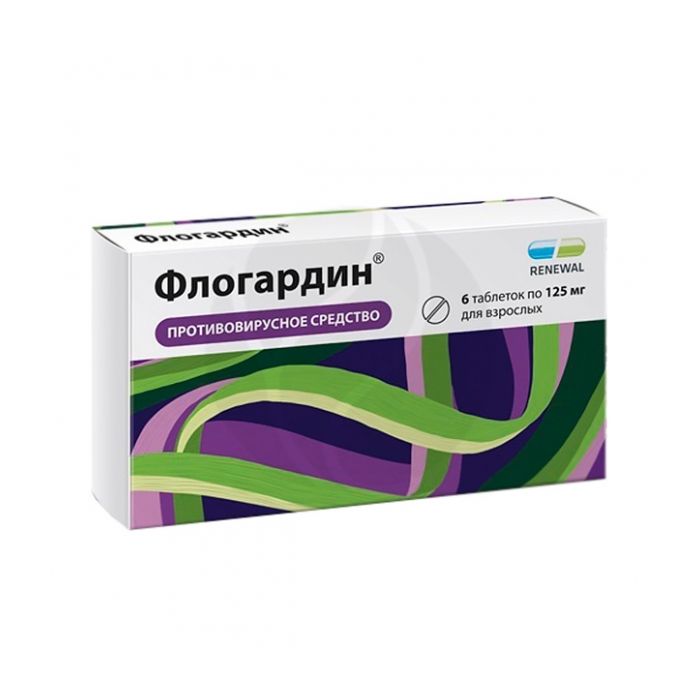Flogardin tablets 125mg, No. 6
Expiration Date: 11/2025
Russian Pharmacy name:
Флогардин таблетки 125мг, №6
As part of complex therapy: viral hepatitis A, B and C; infections caused by Herpes simplex viruses type 1 and 2, Varicella zoster, cytomegalovirus; infectious-allergic and viral encephalomyelitis (multiple sclerosis, leukoencephalitis, uveoencephalitis); urogenital and respiratory chlamydia; non-gonococcal urethritis; pulmonary tuberculosis.
Treatment and prevention of influenza and other acute respiratory viral infections.
Inside, after eating.
For adults:
For the treatment of influenza and other acute respiratory viral infections - 125 mg per day for the first 2 days of treatment, then 125 mg every 48 hours. For the course - 750 mg (6 tablets). For the prevention of influenza and other acute respiratory viral infections - 125 mg once a week for 6 weeks. For the course - 750 mg (6 tablets).
For the treatment of herpes infection - the first two days for 125 mg, then after 48 hours for 125 mg.
Heading dose - 1.25-2.5 g (10-20 tablets).
When treating influenza and other acute respiratory viral infections, if the symptoms of the disease persist for more than 4 days, you should consult a doctor.
Use the drug only according to the indications, the route of administration and the doses indicated in the instructions.
Orange film-coated tablets, round, biconvex; on a cross-section, the core is orange, slight darker or lighter blotches are allowed.
1 tab.
tilorone dihydrochloride 125 mg
Excipients: microcrystalline cellulose 101 - 120 mg, potato starch - 46 mg, povidone K30 - 3 mg, calcium stearate - 3 mg, croscarmellose (croscarmellose sodium) - 3 mg.
Pregnancy,
lactation (breastfeeding),
children under 7 years old,
hypersensitivity to tilorone.
pharmachologic effect
Low molecular weight inducer of endogenous interferon. It is a synthetic compound of the aromatic series, belongs to the class of fluorenones. Stimulates the formation of alpha, beta, gamma interferons in the body. The main structures producing interferon in response to the administration of tilorone are intestinal epithelial cells, hepatocytes, T-lymphocytes, granulocytes. After oral administration, the maximum production of interferon is determined in the intestine-liver-blood sequence after 4-24 hours. In human leukocytes, tilorone induces the formation of interferon, the level of which in the blood is 250 U / ml.
It has an immunomodulatory effect: stimulates bone marrow stem cells, increases antibody production depending on the dose, increases the ratio of high-avidity / low-avidity antibodies, reduces the degree of immunosuppression, restores the ratio of T-helpers / T-suppressors.
Side effect
Possibly: short-term chills, allergic reactions.
In some cases: dyspeptic symptoms.
Application during pregnancy and lactation
Tiloron is contraindicated for use during pregnancy and lactation (breastfeeding).
Application in children
Contraindicated in children under 7 years of age.
special instructions
It is not recommended to use tilorone in doses exceeding the recommended ones in order to avoid possible short-term depletion of immunocompetent cells.
As part of the complex therapy of neuroviral infections, tilorone is used under the supervision of a physician.
Drug interactions
Tiloron is compatible with antibiotics, traditional treatments for viral and bacterial diseases.

